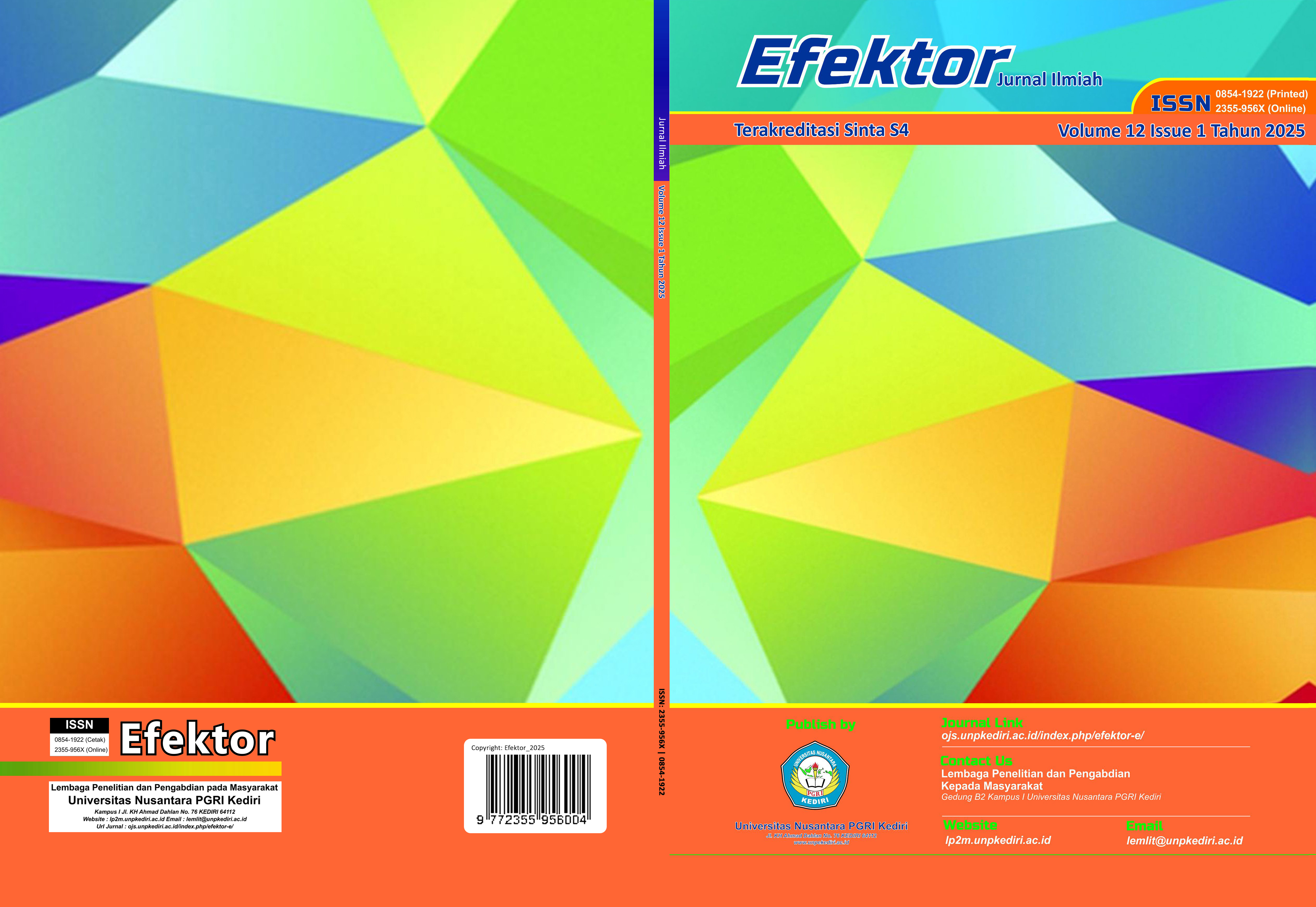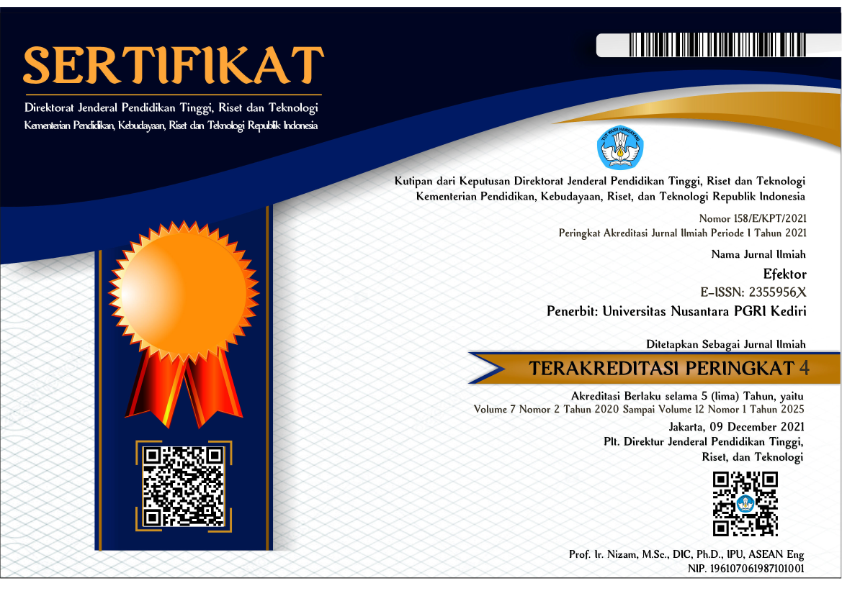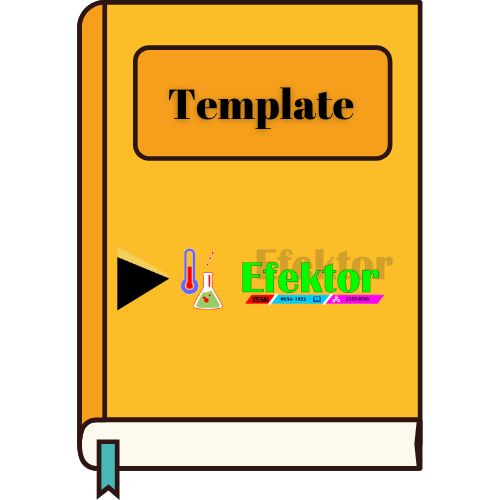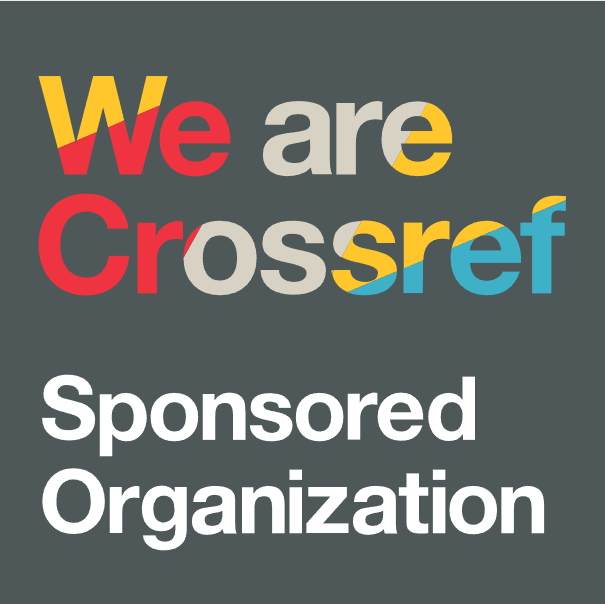The Influence of Teacher's Teaching Skills, Social Intelligence, And Learning Style on The Learning Outcomes of Students of SD Negeri Sembung
DOI:
https://doi.org/10.29407/e.v12i1.25230Keywords:
learning outcomes, learning styles, social intelligence, teacher teaching skillsAbstract
The quality of education is determined by students' learning outcomes, which reflect changes in their knowledge, skills and attitudes. This study aims to analyse the effect of teachers' teaching skills, social intelligence, and learning styles on student learning outcomes, both partially and simultaneously. This study uses a non-experimental quantitative method (correlation). The study population included 136 people, consisting of 127 students and 9 teachers at SD Negeri Sembung, with a saturated sample technique. Data were collected through questionnaires and students' report card documents and then analysed using t test (partial) and f test (simultaneous). The results show that partially tcount> ttable, meaning that there is a positive and significant influence on student learning outcomes between teacher skills in teaching (tcount = 3.296), social intelligence (tcount = 2.346), and learning styles (tcount = 7.204) with (ttable = 1.6615). Simultaneously, the three variables contribute to improving learning outcomes. Thus, the better the teacher's skills, social intelligence, and students' learning styles, the higher the learning outcomes achieved.
References
A, I. (2014). Kecerdasan Optimal: Cara Ampuh memaksimalkan Kecerdasan Anak. Starbooks.
Alam, S. (2023). Hasil PISA 2022, Refleksi Mutu Pendidikan Nasional 2023. Media Indonesia. https://mediaindonesia.com/opini/638003/hasil-pisa-2022-refleksi-mutu-pendidikan-nasional-2023
Almunawaroh, T., Nurfauzi, Y., & Welani, P. T. (2023). Pengaruh gaya belajar terhadap hasil belajar siswa kelas XI IPS MAN 2 Cilacap.
Anni, C. T. (2014). Psikologi Belajar. Unnes Press.
Arends, R. I. (2015). Learning to Teach. McGraw-Hill.
Arylien, L. B. U. G. J. B. (2019). Pengaruh Gaya Belajar Visual, Auditorial, Dan Kinestetik Terhadap Prestasi Belajar Siswa Sma Dian Andalas Padang. Jurnal Review Pendidikan Dan Pengajaran, 2(2), 291–296. https://doi.org/10.31004/jrpp.v2i2.486
Atmuji, S. dan A. S. (2015). Pengaruh Kecerdasan Sosial, Kompetensi Profesional dan Perilaku Guru Dalam Mengajar terhadap Efektivitas Pembelajaran pada SMA Negeri di Kecamatan Luwuk Kabupaten Banggai. Manajemen Pendidikan Universitas Negeri Gorontalo, 1–12.
Dayanti, S. S. F. A. (2021). Pengaruh Keterampilan Mengajar Guru terhadap Hasil Belajar Siswa Kelas XI Program Keahlian Akuntansi Di SMK Negeri 6 Makassar. Universitas Negeri Makassar, 8(1), 37–45. http://eprints.unm.ac.id/21018/%0Ahttp://eprints.unm.ac.id/21018/1/ARTIKEL-ABDUL WAHAB-1692042004-PENDIDIKAN AKUNTANSI.pdf
Dirgantoro, A., Eva, N., Hanurrawan, F., & Hitipeuw, I. (2024). Boosting Teacher Work Engagement: The Role of Self-Efficacy, Resilience, and Personality Traits. Jurnal Kajian Bimbingan Dan Konseling, 9(2), 100–114. https://doi.org/10.17977/um001v9i22024p100-114
Gardner, H. (2000). Frames of Mind: The Theory of Multiple Intellegences (Terjemahan). Gramedia.
Goleman, D. (2005). Kecerdasan Emosi untuk Mencapai Puncak Prestasi. PT Gramedia Pustaka Utama.
Handayani, M., Yufridawati, & Perdana, N. S. (2020). Ujian Yang Ideal Di masa Mendatang. In Ujian Yang Ideal Di masa Mendatang. https://pskp.kemdikbud.go.id/assets_front/images/produk/1-gtk/buku/1629813314_Puslitjak_10_Ujian_yang_Ideal_di_Masa_Mendatang.pdf
Hasanah, T. N. (2018). Pengaruh Keterampilan Mengajar Guru terhadap Hasil Belajar Siswa Kelas X AK SMK Swasta BM AL-Fattah Medan T.P 2017/2018.
Helmiati. (2013). Micro Teaching Melatih Keterampilan Dasar Mengajar. In Sustainability (Switzerland) (Vol. 11, Issue 1). Aswaja Pressindo.
Hendriana, E. C. (2018). Pengaruh Keterampilan Guru dalam Mengelola Kelas terhadap Hasil Belajar Peserta Didik di Sekolah Dasar. JPDI (Jurnal Pendidikan Dasar Indonesia), 3(2), 46. https://doi.org/10.26737/jpdi.v3i2.780
Indriastuti, A., Sutaryadi, & Susantiningrum. (2017). Pengaruh Kesiapan Belajar Siswa dan Keterampilan Mengajar Guru Terhadap Hasil Belajar. Jurnal Informasi Dan Komunikasi Administrasi Perkantoran, 1(1), 37–52.
Irawati, I., Ilhamdi, M. L., & Nasruddin, N. (2021). Pengaruh Gaya Belajar Terhadap Hasil Belajar IPA. Jurnal Pijar Mipa, 16(1), 44–48. https://doi.org/10.29303/jpm.v16i1.2202
Kemendikbudristek. (2022). Kurikulum Untuk Pemulihan Pembelajaran. Pusat Kurikulum Dan Pembelajaran, 130.
Khairat, S. F. & A. (2023). The Impact of Teacher Skills’ on Students’ Interest And Learning Outcomes. 1(1), 1–10.
Manullang, R. A. (2019). Pengaruh Kecerdasan Sosial terhadap Prestasi Belajar Siswa di SMK Negeri 2 Kota Jambi. Jurnal Ilmiah Universitas Batanghari Jambi, 15(3), 19–22. http://ji.unbari.ac.id/index.php/ilmiah/article/view/146/141
Marpaung, J. (2016). Pengaruh Gaya Belajar Terhadap Prestasi Belajar Siswa. KOPASTA: Jurnal Program Studi Bimbingan Konseling, 2(2), 13–17. https://doi.org/10.33373/kop.v2i2.302
Mas’ud, M. (2018). Hubungan Keterampilan Mengajar Guru terhadap Hasil Belajar Murid Di SD Negeri Model 24 Taraweang Kabupaten Pangkep. Nucleic Acids Research, 6(1), 1–7. http://dx.doi.org/10.1016/j.gde.2016.09.008%0Ahttp://dx.doi.org/10.1007/s00412-015-0543-8%0Ahttp://dx.doi.org/10.1038/nature08473%0A
Munro, C. (2020). A continuum of professional learning conversations: coaching, mentoring and everything in between. CollectivED [11] Pp, July 2020, 37–42.
Nia, R. (2020). Pengaruh Gaya Belajar Siswa Terhadap Hasil Belajar Pendidikan Agama Islam Siswa Kelas IV SD Negeri 5 Metro Timur. 2507(February), 1–9.
Nurmalasary. (2018). Pengaruh Gaya Belajar dan Kemandirian Belajar terhadap Prestasi Belajar Matematika. JKPM (Jurnal Kajian Pendidikan Matematika), 3(2), 189. https://doi.org/10.30998/jkpm.v3i2.2767
OECD. (2024). PISA 2022 Results (Volume III): Creative Minds, Creative Schools, PISA. Factsheets, I, 1–9. https://www.oecd-ilibrary.org/education/pisa-2022-results-volume-i_53f23881-en%0Ahttps://www.oecd.org/publication/pisa-2022-results/country-notes/germany-1a2cf137/
Pangesti, W. (2018). Pentingnya Memahami Gaya Belajar, Seri Manual Gls Pentingnya Memahami Gaya Belajar.
Prasetya, F. D. (2012). Pengaruh Gaya Belajar Terhadap Prestasi Belajar Mata Diklat Listrik Otomotif Siswa Kelas XI Teknik Perbaikan Bodi Otomotif SMKN 2 Depok Sleman.
Prawira, P. A. (2013). Psikologi Pendidikan dalam Perspektif Baru. Ar-Ruzz Media.
Rabiatun, N. (2021). Pengaruh Keterampilan Mengajar Guru Terhadap Hasil Belajar Siswa Pada Mata Pelajaran Ppkn Di Kelas V Sd Negeri 72 Kota Bengkulu. Institut Agama Islam Negeri Bengkulu, 150.
Rais, S. & M. A. R. (2024). Engagement Guru untuk Peningkatan Kreativitas Di MTS Kota Madiun dengan Analisis SITOREM. 2, 90–104.
RGR FM. (n.d.). Sebanyak 6.279 Anak Putus Sekolah di Tulungagung, Terbanyak Putus SMP. Portal Tulungagung. https://rgrfm.tulungagung.go.id/sebanyak-6-279-anak-putus-sekolah-di-tulungagung-terbanyak-putus-smp/
Riska. (2017). Pengaruh keterampilan mengajar guru terhadap hasil belajar siswa pada mata pelajaran Akuntansi. 1–6.
Sari, A. I. (2015). Pengaruh Kecerdasan Sosial dan Minat Belajar terhadap Hasil Belajar Matematika Materi Kubus dan Balok Siswa Kelas VIII SMP Negeri 1 Gondang Tulungagung. 18.
Setiawan, G. A. (2019). Analisis Pengaruh Kecerdasan Sosial terhadap Hasil Belajar IPS Siswa Kelas V Di Gugus 2 Kecamatan Panji. 97–108.
Sugiyono. (2022). Metode Penelitian Kuantitatif, Kualitatif dan R dan D. Alfabeta.
Susanto, A. (2013). Teori Belajar dan Pembelajaran di Sekolah Dasar. Prenada Media Group.
Theodora, B. D. (2016). Pengaruh Keterampilan Mengajar Guru Terhadap Hasil Belajar Siswa Sma Se-Kota Malang Yang Di Kontrol Dengan Variasi Sumber Belajar. Journal of Accounting and Business Education, 2(4). https://doi.org/10.26675/jabe.v2i4.6079
Yandi, A., Nathania Kani Putri, A., & Syaza Kani Putri, Y. (2023). Faktor-Faktor Yang Mempengarui Hasil Belajar Peserta Didik (Literature Review). Jurnal Pendidikan Siber Nusantara, 1(1), 13–24. https://doi.org/10.38035/jpsn.v1i1.14
Zakiatul, H. R. (2021). Gaya Belajar (Learning Style). Literasi Nusantara.
Zebua, E. N. K., & Zebua, N. (2024). Analisis prinsip dan peran asesmen autentik pada proses dan hasil belajar peserta didik. Edukasi Elita: Jurnal Inovasi Pendidikan, 1(2), 128–136. https://doi.org/10.62383/edukasi.v1i2.133
Downloads
Published
Versions
- 2025-05-29 (2)
- 2025-05-29 (1)
Issue
Section
License
Copyright (c) 2025 Erfan Afandi, Imam Sujono, Ajar Dirgantoro

This work is licensed under a Creative Commons Attribution-ShareAlike 4.0 International License.
Authors who publish with this journal agree to the following terms:
- Copyright on any article is retained by the author(s).
- The author grants the journal, the right of first publication with the work simultaneously licensed under a Creative Commons Attribution License that allows others to share the work with an acknowledgment of the work’s authorship and initial publication in this journal.
- Authors are able to enter into separate, additional contractual arrangements for the non-exclusive distribution of the journal’s published version of the work (e.g., post it to an institutional repository or publish it in a book), with an acknowledgment of its initial publication in this journal.
- Authors are permitted and encouraged to post their work online (e.g., in institutional repositories or on their website) prior to and during the submission process, as it can lead to productive exchanges, as well as earlier and greater citation of published work.
- The article and any associated published material is distributed under the Creative Commons Attribution-ShareAlike 4.0 International License













